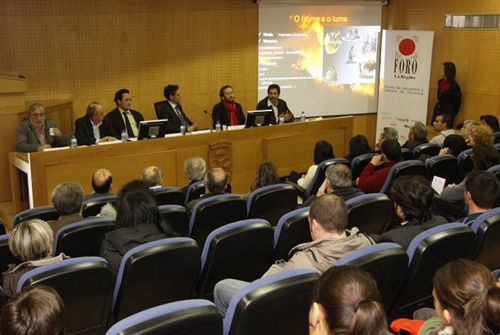Submitted by laborate on Wed, 02/05/2012 - 19:57 GMT.
Last April 25th the universitary campus of Orense
(Spain) hosted the conference and panel discussion about
forest fires "Why Galicia burns?". It was organized by the
newspaper La Región.

The roundtable was addressed by Alvaro García, environmental
public prosecutor for the region of Galicia; José Alfredo
Pereira, president of the Organización Galega de Comunidades
de Montes Veciñais en Man Común; Elier Ojea, president of
Confemadera - Galicia; José Luis Castro, chairman of the
Federación Ecologista Galega; and Rafael Crecente, professor
at the University of Santiago de Compostela and coordinator
of the Master in Sustainable Land Planning.
This group of experts attempted to disclose several arguments
and proposals to the conference attendees. Although the
initial question was "Why?", the debate gradually shifted
towards more concrete questions, but not less interesting.
According to professor Crecente, one of the main causes
of forest fires is the shift in the land management model
happened during the last decades of the twentieth century,
which was a consequence of the huge social and economic
transformations experienced in Galicia, as well as the whole
country. The previous land management applied to Galicia,
which had been operating for centuries, was characterized
by (a) Land management policies preferably collective (80%)
versus individual (20% and with high degree of fragmentation)
and (b) The existence of a set of informal institutions
(mutual agreement rules) that facilitated land management
and use.
Unlike the previous land management model, the new one caused
the abandonment of rural areas. Thus there were deep changes
in land use and landscape, most notably from the standpoint
of risk of forest fire (a) The increase of urban area size,
but also woodland and (b) The increase of the areas occupied
by scrubs and hardwood tree species.
Among the proposals of the round table to find solutions
to this problem - which in recent years has worsened - are
retrieving the relationship between individuals and territory,
understand forest fires as a symptom rather than a disease,
approach the problem from a comprehensive perspective instead
of sectoral (or forest industry), introduce land management
innovations (make land fragmentation viable, reaching new
'institutional arrangements') or give more importance to
research, development and innovation, in the fields of social
sciences and information technologies.
related links and downloads: